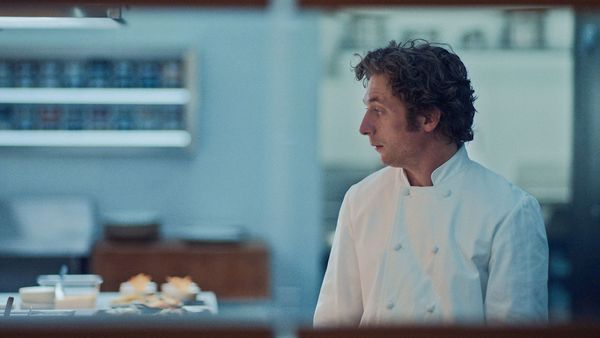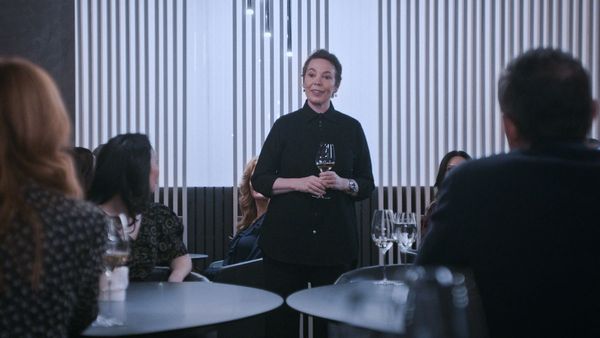Joel McHale’s living nightmare of a New York chef turns up for the first time in the second episode of “The Bear,” malevolently hovering inches from the hero’s right shoulder. Horrific doesn’t begin to sum up the man’s management skills properly – he is concentrated nuclear fallout in human form. A plague of acid vomit.
Moments after he strides into the scene, firing a line cook for messing up a sauce, the celebrated culinary master sets to barking random numbers into Carmen Berzatto’s (Jeremy Allen White) ear to throw off his system.
Then come the toxic whispers. “I get it – you have a short man's complex. . . . Is why you have the tattoos and your cool little scars and you go out and take your smoke breaks? It’s fun, isn't it? But here's the thing: you're terrible at this. You're no good at it.”
Charring his star employee with curses, he berates him for his supposed slowness and orders him to repeat, “Chef, I’m so tough.”
“You are not tough,” the man responds. “ . . .You are talentless . . .You should be dead.”
We’ve all had at least one manager who’s unforgettable for all the wrong reasons. Maybe he constantly undermined your skills and took credit for your successes, as McHale’s chef does to Carmy. Maybe she prioritized your output over your mental and physical health. McHale’s character is horrendous to such a degree that some who watched the first two seasons of “The Bear” theorized he didn’t exist, that he was merely a figment of Carmy's lowest insecurities.
Feeding that hypothesis are the times the past manager manifested as an illusion, as during the soft opening for The Bear when Carmy thinks McHale’s thug is judgmentally staring at him from a corner, malevolent grin plastered across his face.
But he’s real, and as “Forever,” the third season finale finally reveals, he has a name: David Fields. A moniker so commonplace as to make someone who wants to be great resolve to conquer the mountaintop at all costs, delivering a kick in the teeth to anyone who might threaten to join him on his peak.
Carmy is such a contender, so Fields leaves the kid’s soul covered in scar tissue. But Carmy also exemplifies the best of what his other mentors imparted to him – great chefs like Daniel Boulud, who teaches him to hear music in sizzling oil.
Or The French Laundry’s Thomas Keller, who gently speaks to Carmy about the profound spirituality of their profession and the legacy he’s continuing, all while teaching him how to truss a chicken.
Even more, there is Olivia Colman’s Chef Andrea Terry, the founder and heart of Ever who, in the third season finale, marks her retirement with the dinner to end all the restaurant’s dinners for everyone who has worked for her and everyone who is anyone in the culinary universe.
Including David Fields.
 Jeremy Allen White as Carmy in "The Bear" (FX)
Jeremy Allen White as Carmy in "The Bear" (FX)
Carmy can’t help staring down Fields to a degree that makes his dinner companions Sydney Adamu (Ayo Edebiri) and his old friend Luca (Will Poulter) uncomfortable. When they ask who he’s staring at, and Carmy says his name, they both recoil.
Carmy’s obsession with him, and the fact that he still describes him as the “worst and one of the best chefs in the world” takes Luca by surprise. Mostly because Luca is confident and composed, correcting Carmy by saying, “Used to be one of the best chefs in the world.”
McHale’s character is horrendous to such a degree that some who watched the first two seasons theorized he didn’t exist.
But Carmy can’t be reeled in. Curse words sputter out of him like a lawn sprinkler as he describes his old boss as “very probably mentally ill. Dead inside. Cold. Never turns it off. Accomplishes more by 10 a.m. than most people do in a lifetime. I don’t think he sleeps. I don’t think he eats. I don’t think he loves. Hates black pepper for some reason.”
Then, to his friends’ shared horror, Carmy leaps out of his seat to chase his torturer to the bathroom.
Participating in the workforce at any level guarantees a person will deal with a terrible boss, but it’s how and whether you carry them into your future that matters.
Distilling this into action, causes and effects becomes the crux of Carmy’s third season journey when in striving to realize his and Syd’s dreams, he alienates her and cousin Richie (Ebon Moss-Bachrach), his childhood friend and front-of-house managers.
Syd trained at the Culinary Institute of America but she didn’t stage at the world’s greatest restaurants like Carmy did. They connect because she understands Carmy, and he sees in her the potential he had when he was first striking out, only without the bedrock of family dysfunction and psychological abuse that enabled him to absorb Chef Fields’ abuse.
That informs Carmy’s faltering efforts to refrain from turning into his tormentor even as he demands excellence. When it’s time to impart that lesson to Richie he sends him not to Fields’ hellfire but to Ever, where Colman’s Chef Terry ensures her kitchen is a place of efficiency and serenity, or as much as any in a world-class kitchen can be.
We need your help to stay independent
Ever’s emphasis on excellence is an extension of the respect she has for her employees and her customers, and the respect she has for food and the art of preparing it. Carmy carries that with him too, along with the memory of her shutting down Carmy’s aggressive tone with a firm, “Quiet, chef.”
A sign bearing a version of her motto “Every Second Counts” hangs over Syd, Carmy, Marcus, Tina and everyone else in The Bear’s kitchen. But Carmy’s interpretation of its meaning differs from what Chef Terry imparts to her people because of the scars Chef Fields left on his soul.
 Olivia Colman in "The Bear" (FX)
Olivia Colman in "The Bear" (FX)
So it is that on the last night of Ever, the man always wringing himself inside out to be better than the best finds himself between those mentors.
Strange how the worst experiences in our lives needle more extremely in our brain than the best ones, isn’t it? On “The Bear” Carmy’s warmest memories of Chef Terry and Luca, with whom he worked at Ever, are fragments. Whereas Carmy can recall every intonation in Fields’ insults.
Participating in the workforce guarantees a person will deal with a terrible boss, but it’s how and whether you carry them into your future that matters.
Studies on workplace satisfaction abound with more media outlets paying attention to them in the aftermath of the pandemic, especially with the prevalence of quiet quitting. Self-help guides on handling terrible bosses are everywhere, along with data associated with how terrible managers can shorten your lifespan and murder a company’s health, several cited in this 2018 Harvard Business Review article.
The 46% of Monster.com poll respondents who identified micromanagement as a reason to leave a job may have found the version Chef Fields exerted on Carmy particularly uncomfortable. Less, probably, than when he confronts the man at Ever’s funeral dinner. There are few if any manuals on what to do in those circumstances although (I can confirm from personal experience) it happens.
“The Bear” very helpfully shows us what not to do by having Carmy finally come face to face with the man who gave him ulcers, panic attacks and nightmares, and having Fields smugly reply, “You were an OK chef when you started with me. And you left an excellent chef. So you're welcome.”
As for the ulcers and the rest, Fields reframes those as “I gave you confidence and leadership and ability.”
“My life stopped,” says an apoplectic Carmy. An unmoved Fields responds, “That's the point. Right? . . . You wanted to be excellent. So . . . you concentrated and you got focused and you got great. You got excellent. It worked. You’re here. Look at all this.”
All that, after Carmy confesses to the main who ground him into a pulp that he can’t get him out of his brain, to which Fields coolly replies he doesn’t think about Carmy at all.
Want a daily wrap-up of all the news and commentary Salon has to offer? Subscribe to our morning newsletter, Crash Course.
“The Bear” has much to say about what greatness requires, largely landing on the side of care and nurturing over the notion that has long prevailed in creative professions that the road to genius and acclaim requires enduring and surviving fiendishness.
Mind you, Chef Terry doesn’t entirely sidestep that ego trap; as she tells Richie in the second season episode “Forks,” she was arrogant when she was younger until a public faceplant in the industry humbled her. Neither does she do much to humble her lead chef (Adam Shapiro) when he launches into a pre-service tirade.
And this is the other side of the choice set before Syd as the season ends – step into greater responsibility and possible acclaim with an unknown chef manager who claims to believe in her or remain with her good-hearted, determined and haunted current partner carrying his worst mentor’s teachings into his management style.
He’s caught between Fields’ flawed belief that fear pushes forth excellence and Terry’s trust that caring for others gets us over the hump, like the cheesy proverb about the two wolves inside us all. By feeding the rabid one, Carmy risks making Fields' harm a part of his legacy, passing along the recipe of how bad bosses yield others down the road.
All episodes of "The Bear" are streaming on Hulu.
Read more
about this topic



Shares